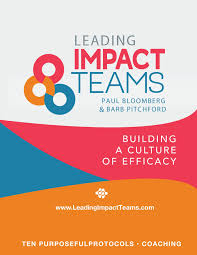 Learning how to promote teacher, student, and collective efficacy Teachers are a school's greatest resource. Excellent teachers make excellent schools. Leading Impact Teams taps into the scheduled team planning time every school already has, and repurposes it in a model that provides the processes needed to build teacher expertise and increase student learning. The model combines two existing practices, formative assessment and collaborative inquiry, and promotes a school culture in which teachers and students are partners in learning. Readers will learn how to: * Build a culture of efficacy * Take collective action * Embed student-centered assessment in the classroom culture * Clarify learning goals for success * Leverage progressions of learning for "just right" instruction * Utilize evidence-based feedback.
Learning how to promote teacher, student, and collective efficacy Teachers are a school's greatest resource. Excellent teachers make excellent schools. Leading Impact Teams taps into the scheduled team planning time every school already has, and repurposes it in a model that provides the processes needed to build teacher expertise and increase student learning. The model combines two existing practices, formative assessment and collaborative inquiry, and promotes a school culture in which teachers and students are partners in learning. Readers will learn how to: * Build a culture of efficacy * Take collective action * Embed student-centered assessment in the classroom culture * Clarify learning goals for success * Leverage progressions of learning for "just right" instruction * Utilize evidence-based feedback.
Barb Pitchford is a national consultant focusing on leadership for school improvement. During her 30 plus years in public education, Barb has worked at all school levels – high, middle, and elementary – as a teacher, counselor, and administrator. For the past 10 years Barb has worked as a professional learning consultant specializing in powerful and practical leadership for improved learning for both students and teachers. Currently, Barb works with Corwin Press as a consultant teaching, coaching and consulting on John Hattie’s Visible Learning work, Leading Impact Team, and is the Executive Director of Professional Learning and co-founder of The Core Collaborative. Barb’s passion is supporting schools to use their greatest resource - their teachers, to build knowledge, skills, and confidence to ensure success for both students and teachers. Based on research around collaboration and formative assessment, Barb specializes in developing Impact Teams to improve teacher expertise and increase student achievement. Putnam Elementary is honored to have been personally coached by Barb for the past three years.


